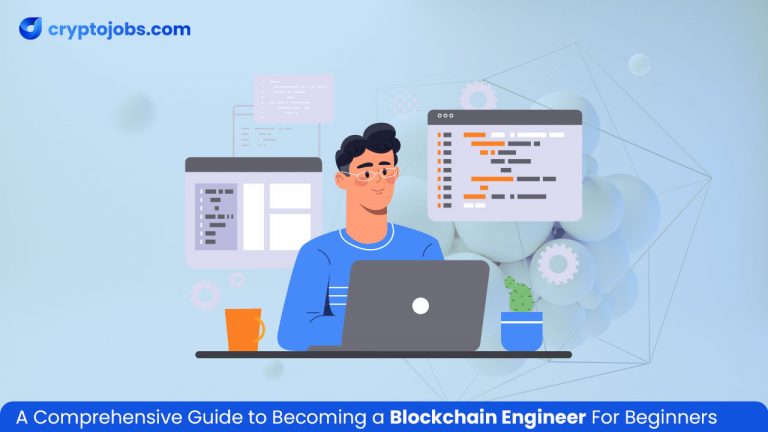
A Comprehensive Guide to Becoming a Blockchain Engineer For Beginners
- cryptojobs.com
- April 16, 2024
- All Posts, Career Guide
- Blockchain Careers
- 0 Comments
Blockchain technology has taken over the digital world and changed how we perceive the internet, data privacy, and more. Originally intended to support Bitcoin, Blockchain proved to be applicable and secure enough to start getting noticed by many different industries as they explored its possible implementation in their tasks.
As this opened new avenues for growth, it opened doors for blockchain engineers to establish their careers with full financial security and success. Needless to say, there is a huge demand for blockchain engineers. If you are interested in starting a career in blockchain, this is the right time for you to do it.
Let us now understand how one becomes a blockchain engineer. This comprehensive guide will provide answers to all of your pressing issues.
What is Blockchain Engineering?
Blockchain engineering involves creating and administrating a distributed ledger platform. Developing a blockchain network involves allocating maximum resources and proficiency in the field. A blockchain application is, in essence, a program or a system created with or for a certain blockchain platform. These applications or systems are secure, transparent, and reliable.
Check out: How Much Does a Blockchain Engineer Earn
How to Become a Blockchain Engineer as a Beginner
As more industries adopt blockchain technology, the demand for blockchain engineers is rising by the day. These talented individuals are one of the most sought-after professionals in the industry. As long as you have a passion for technology and innovation, this might be the perfect career option for you. If you are interested in becoming a blockchain engineer, here is a guide that will help you out.
Understand the Fundamentals of Blockchain
Enroll in a course to comprehend blockchain technology, starting with its main components, which include decentralization, cryptocurrency, mining operations, and developing blockchain tools. You should master the fundamental blockchain concepts that form the foundation, such as blocks, transactions, timestamps, hashes, and consensus mechanisms.
Gain Experience as a Blockchain Engineer
Start with participating in hackathons, competitions, or real blockchain projects can help you become practically skilled, which will also boost your CV. After that, use your knowledge to create a digital ledger technology via initial block allocation, adding new holds to the chain, verifying the blockchain, and merging this technology with your business.
Study Solidity & Smart Contracts
Solidity programming language is used to create smart contracts for the Ethereum platform. It is one of the most important languages that you should master if you want to succeed in your career as a blockchain engineer. Smart contracts are intended to facilitate communication between counterparties, thereby eliminating intermediaries and reducing costs. These self-executing contracts are an integral part of any dApp so it is important for every blockchain engineer to build an expertise in it.
Study Coding and Obtain Certification
You should join a technical college programming course, enroll for an online platform, or start the learning coding process on your own at home. As an aspiring blockchain developer, you should master programming languages such as Python, Solidity, and JavaScript through online platforms and tutorials.
Salary of a Blockchain Engineer
The median salary of a blockchain engineer is currently calculated to be $147k per year, as per ZipRecruiter. The demand for Blockchain Engineers is also on the rise, and this figure is likely to increase in the coming years. Given that Blockchain technology is currently growing and is being used more, the need for talented Blockchain engineers will also grow proportionally.
Benefits of Becoming a Blockchain Engineer
The blockchain engineering process is quite challenging, and it requires a detailed understanding of the fundamental blockchain technologies. Furthermore, this entails sufficient power to work with larger amounts of data and ensure data safety and security.
The following are the top benefits of becoming a blockchain engineer in 2024:
- Enables developers to create scalable and secure apps: Some developers take this advantage to a higher level and build secure and reliable apps that assist companies in achieving their vision.
- Stay at the forefront of innovation: Working as a blockchain software engineer implies that you will be on the very edge of the technology itself.
- Career diversification: Unlike other professions, blockchain development opens up a diverse set of field-specific careers that can be adapted to situations according to the context. When you are a diligent solo problem-solver and achieve self-reward with highly complex tasks, you may decide that a career as a blockchain engineer fits you well.
- Data control: Unlike databases that require storing the data with a specific data format, programmers are not limited in their selection of the data storage. Everything that takes place within a blockchain is public and corresponds to a network that is peculiar and transparently tracked.
- Create customized smart contracts: Through the use of blockchain, the teasing out of transactions can be complicated, and thus, the employment of smart contracts is an absolute essential utility often not found in other environments.
What Does a Blockchain Engineer Do?
Blockchain engineers oversee building DApps and smart contracts using blockchain technology. They write codes and render blockchains, and they use them as platforms for games and generally as transaction layers that help new cryptocurrencies thrive.
Blockchain Engineer Job Description
A Blockchain developer’s daily responsibilities include:
- Developing Blockchain protocols.
- Constructing a network construct for sharing Blockchain information or keeping its centralization.
- This includes the third party’s approval of the production of back-end blockchain transactions according to the blockchain protocol.
- Build the architecture of the software or website as per customer specifications.
- Smart contracts should be written with proper conditions.
Different Types of Blockchain Engineers
To provide the most accurate response to this question, it’s essential to understand that there are two main types of blockchain engineers:
Blockchain Core Engineers
- Planning to hold engineering strategy and progression.
- Develop the rule guides and the blockchain setup to be simple and easy to understand.
- Define the consensus algorithm, the protocol that directs the blockchain participants to share and execute various functions, such as transferring assets.
- Scale network security policy and implementation to achieve maximum operational efficiency.
- Develop a plan, schedule, and execute integrations of public and/or private blockchain networks with other systems.
Blockchain Software Engineers
- Produce plans and implement them according to the main blueprint.
- Designing and implementation of decentralized applications (DApps).
- Use smart contracts in a manner that specifies what is learned by facility managers.
- Provide the necessary conditions so that users will easily and safely connect to DApps.
Smart Contracts Engineers
- Design and implement smart contracts to automate different stages of the process and reduce the overhead.
- Working with clients and stakeholders helps in deciding the most suitable solution to sensitive issues and achieving the required results.
- Prioritization is set to detect any shortcomings in smart contracts.
- Ensure end-to-end testing of the business process.
Conclusion
Eventually, everything ends with the fact that blockchain technology is part of the future of the internet. If one aspires to learn blockchain technology or programming, this is the right time for a learner to acquire core competencies and become an efficient Blockchain software engineer.




